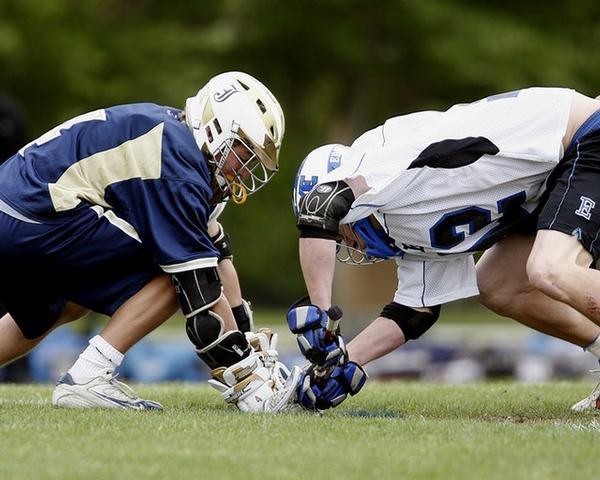Return To Blog
Casper Physical Therapy Explains High School Football Injuries
October 31, 2018
Each year, there are more than a half million injuries each year on American high school football fields. Given the severity and impact of these injuries, it is best to act as soon as possible—even if signs and symptoms seem non-existent. It is a mistake many students make that can affect them throughout their life. Learn about the top types of high school football injuries, handling concussions, and using Casper physical therapy to recover.Â
Â
Given that football is a contact sport, injuries may occur. Some of the most common injuries experienced by student athletes include:
Achilles tendonitis: Swelling can occur when the Achilles tendon (back of the ankle) is strained.Â
Fractures: Contact or quick movements can lead to fractures in the hands, legs, and more.Â
Knee: Occurring from rapid twisting movements or contact, ligaments in the knee can be stretched or torn.Â
Rotator cuff: The rotator cuff is a primary support within the shoulder. When strained, it can lead to radiating arm pain.Â
Strains: Strains occur when muscles in an area have been overly stretched. They can be painful when overly extended or if they tear.Â
Sprains: Sprains arise when ligaments, which connect muscles to bones, are negatively impacted. They can be overstretched or tear.Â
Concussions are brain injuries, commonly due to an impact to the head, as well as quick, rapid movements. These rapid movements cause the brain to move around, causing issues. This movement can cause bruising or problems with crucial blood vessels. Upon receiving a blow, a student-athlete should be checked out as soon as possible. Signs of a concussion include:Â
The go-to way a student-athlete needs to recover from a concussion is to rest. Many wonder, “is it safe to sleep if you have a concussion?†If symptoms are minimal, it may be fine. It is best to go by the advice of a doctor to be certain. In extreme cases, falling asleep with a concussion can lead to a loss of consciousness.Â
For injured student football players, it is imperative to see a local physical throughout the recovery process. A premier physical therapist will ensure your student takes proper measures for a swift and successful recovery. From there, physical therapists can help the student improve their sport. This can be done by teaching various stances and techniques to avoid injuries. Students that have not sustained an injury will still benefit from training with a physical therapist to avoid getting hurt in the future. For many students, an injury can be career ending, which is unfortunate before their actual athletic career really begins.Â
If your child has sustained an injury playing football, North Platte Physical Therapy’s sports medicine team will aid in their recovery. Specializing in student-athletes, we can help with recovery as well as athletic training. This will help your student avoid injuries in the future and become a stronger, quality athlete. Contact us today to schedule an appointment.Â
Â
Â
Most Common Types of Injuries
Given that football is a contact sport, injuries may occur. Some of the most common injuries experienced by student athletes include:
Achilles tendonitis: Swelling can occur when the Achilles tendon (back of the ankle) is strained.Â
Fractures: Contact or quick movements can lead to fractures in the hands, legs, and more.Â
Knee: Occurring from rapid twisting movements or contact, ligaments in the knee can be stretched or torn.Â
Rotator cuff: The rotator cuff is a primary support within the shoulder. When strained, it can lead to radiating arm pain.Â
Strains: Strains occur when muscles in an area have been overly stretched. They can be painful when overly extended or if they tear.Â
Sprains: Sprains arise when ligaments, which connect muscles to bones, are negatively impacted. They can be overstretched or tear.Â
Handling Concussions
Concussions are brain injuries, commonly due to an impact to the head, as well as quick, rapid movements. These rapid movements cause the brain to move around, causing issues. This movement can cause bruising or problems with crucial blood vessels. Upon receiving a blow, a student-athlete should be checked out as soon as possible. Signs of a concussion include:Â
- Blurred vision
- Brain fog
- Dizziness
- Fatigue
- Headaches
- Loss of consciousness
- Nausea
- Slurred speech
- Tinnitus
- Vomiting
The go-to way a student-athlete needs to recover from a concussion is to rest. Many wonder, “is it safe to sleep if you have a concussion?†If symptoms are minimal, it may be fine. It is best to go by the advice of a doctor to be certain. In extreme cases, falling asleep with a concussion can lead to a loss of consciousness.Â
Recovery and Physical Therapy
For injured student football players, it is imperative to see a local physical throughout the recovery process. A premier physical therapist will ensure your student takes proper measures for a swift and successful recovery. From there, physical therapists can help the student improve their sport. This can be done by teaching various stances and techniques to avoid injuries. Students that have not sustained an injury will still benefit from training with a physical therapist to avoid getting hurt in the future. For many students, an injury can be career ending, which is unfortunate before their actual athletic career really begins.Â
If your child has sustained an injury playing football, North Platte Physical Therapy’s sports medicine team will aid in their recovery. Specializing in student-athletes, we can help with recovery as well as athletic training. This will help your student avoid injuries in the future and become a stronger, quality athlete. Contact us today to schedule an appointment.Â
Â
